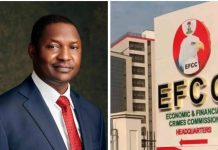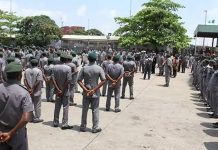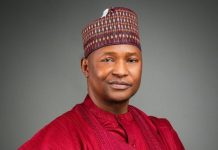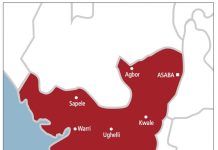By – Abba Hamisu Sani
Africa-Press – Nigeria. 29th of May 2024 will be celebrated as the first one year of President Bola Ahmed Tinubu as the 6th Nigerian democratically elected President of Nigeria right from Shehu Shagari in 1979, President Olusegun Obasanjo in 1999 to 2007 late Umar Musa Yar’Adua in 2007, Goodluck Jonathan from 2009 – 2015 and Buhari from 2015 to 2023.
Nigeria was practicing parliamentary system of government in 1960 when the country gained independence from the British colonial rule to 1966 when the first military coup d’etat toppled the civilian government which led to the assassination of Nigeria’s first prime minister Sir Abubakar Tafawa Balewa.
In 1979 the country decided to adopt a Presidential system of government which after four years witnessed another break due to the military coup in 1984.
The country returned to democracy in 1999 after several agitations by Nigerian politicians such as President Bola Tinubu who even went for an exile before returning to the country and emerged as the Lagos State governor in 1999 under the defunct Alliance for Democracy AD.
The positives of Tinubu’s administration
Even though his administration is overshadowed by what the majority of Nigerians describe as unexpected economic and security challenges, but some aspects of it can be seen as a progress no matter how, for instance, his immediate response to the corruption allegation against one of his cabinet Members,the Minister of Humanitarian affairs and poverty alleviation Dr Betta Edu who was suspended over corruption allegation and diversion of funds meant for vulnerables into personal account.
This action of President Tinubu was seen as a proactive measure to punish his cabinet members, unlike President Buhari who kept his appointees despite several allegations against them.
Also in an effort to attract foreign investors into the country, President Tinubu travels to countries like Qatar to attract investment himself, unlike his predecessor who gave less attention to such.
Ambassador Ibrahim Waiya is chairman Conference of Northern States Civil Society Networks.He said this is the first time in the recent history of Nigeria that the inflation is so high and the dollar exchange rate went extra high but the government strategically intervened as a result the foreign exchange rate is dropping gradually.The Central Bank interventions are yielding results that a very good development and commendable.
“He inherited a bad system, he inherited a bad development unfortunately for him because of the party sentiment he refused to disclose everything he inherited to Nigerians, telling them the situation he finds himself in, “Waiya said
The civil society activist added that Tinubu should have explained to Nigerians what he met on the ground like how the government of his predecessor was collecting loans to pay workers’ salaries every month which was not realistic.
“And if you could remember the time when President Buhari came in, the total loan for Nigeria was around I think 11 trillion naira but before Buhari left government the total money borrowed reached 30 plus trillion which is very huge to the extent that servicing the loan became a very serious problem, as I am talking to you now, they said servicing the loan reached one trillion naira” Ibrahim Waiya stated.
Tinubu’s approach to fighting corruption and respecting human rights is commendable
Waiya expressed appreciation over the way Tinubu handles the misappropriation allegations against his minister of Humanitarian Affairs Dr Betta Edu, he said going by the incidents of what Nigerians saw during the last administration there were many complaints against the ministers then but President Buhari refused to act on that.
“I think the only minister that was sacked by Buhari was the Minister for Agriculture Sabo Na nono, that was the only Minister sacked by Buhari,” he said.
Interns of human rights protection the civil society activists commended Tinubu’s administration also.
“When we are talking about fighting corruption, we are generally talking about the rule of law. Rule of law in the sense that law is taking its position, people are equally treated and also the government respects court orders and judgments. We have seen that Tinubu doesn’t interfere with court cases and some of the things going on within the judiciary arm of government. One such issue has to do with election cases where Tinubu refuses to interfere despite a lot of pressure from his party.
No glaring intervention or interference by the government on issues with election cases especially those at the level of the Court of Appeal and Supreme Court.
We saw many of the judgments that are in favor of the opposition parties like that of Kano, Zamfara, and Plateau states, we all witnessed it.We say that the rule of law is working actually “Waiya stated
The activist added that people were voicing their opinions without intimidation unlike in the administration of Buhari where there were a lot of intimidation cases against citizens, prosecutions, and many cases of missing persons as many people could not be traced.
“I could remember one of the activists from Kaduna State that we are still looking for, he is yet to be found. Nobody could give an account of him, so many people went missing, this is some of the differences” the Chairman Conference of Northern States Civil Society Networks emphasized.
Dr . Abdullahi Abubakar Gwandu is an economic and Public affairs analyst and a lecturer with the College of Business and Management Studies at Kaduna Polytechnic. He said Nigerians should not forget that since 2012 and 2014 the country has Been in a very bad shape economically. The Government inherited a near-bankrupt economy.
“Things were not working, the situation was so bad and you remember as a result the country entered about two recessions in the past, issue of COVID-19, oil prices crisis, and dependent economy, this is what the present government inherited to correct that situation it requires very bold painful and hard decisions and those decisions are what the governments in the past were afraid of taking because of its political and social backlash and therefore for his ability to take this bold step and face bull by the horn, having that courage I think this is commendable” Dr. Gwandu Said
The analyst added that the decision is painful and harsh but he described it as timely considering its expected long-term positive effect.
The immediate effect is severe on the people as all Nigerians are witnessing it.
He said by all indications when the economy stabilized Nigerians would be used to the situation and would get its benefits. The future may not be recent, it may take a long time.
Suggestions on how to improve the economy and avoid IMF and World Bank Policies
Dr . Abubakar Gwandu advises President Tinubu to intensify the fight against corruption which he said is the major obstacle to a prosperous economy in Nigeria.
As President Bola Tinubu is about to reach one year in office his policies and programs should be focused on fighting corruption to achieve the designated initiatives.
Commenting on Tinubu’s achievements during his stay in office, the economist said as the administration is approaching a year, one year is not enough to judge a government with a mandate of four years.
“Remember one year is too short to begin to judge a government even though if you said it publicly people will not be happy about it, but that is the basic truth,” he said.
The Public affairs and economic analyst calls the attention of the Federal Government under President Bola Tinubu to avoid the danger of over-dependence as he said the Nigerian economy should be homegrown.
“There is a need for homegrown policies, policies that can address our situation and those that are peculiar with our culture, our situation, and our state of development and not depending on the World Bank and IMF ” Gwanda advised.
The academician said IMF and World Bank policies are designed for the well-advanced economy. The economies that are stabilized, are not meant for underdeveloped economies or developing economies.
He added that the government should also come up with a strategy that makes Nigeria not an import-dependent economy, a policy that will encourage productivity, a policy that will encourage self-efficiency, and meet Citizens’ needs as much as necessary.
“So as long as we depend on imports on almost everything, we should forget about development, we should forget about our economic growth and we should also forget about stabilizing the system, that is What I mean when I said we should reduce our dependence ” The analyst emphasized.
These views of Ambassador Ibrahim Waiya the chairman Conference of Northern States Civil Society Networks and Dr.Abubakar Abdullahi Gwandu an economic analyst sound common in expressing the positive side of Tinubu’s administration which by May 29th 2024 will be one year old.
The suggestions made by Dr.Gwandu are imperative towards achieving the Nigeria of every citizen’s dream.
There is also a need for Nigerians both at home and in the diaspora to rally around the government by supporting the right policies and programs initiated and contributing their quota in making it a destination for all positive things.
For More News And Analysis About Nigeria Follow Africa-Press







